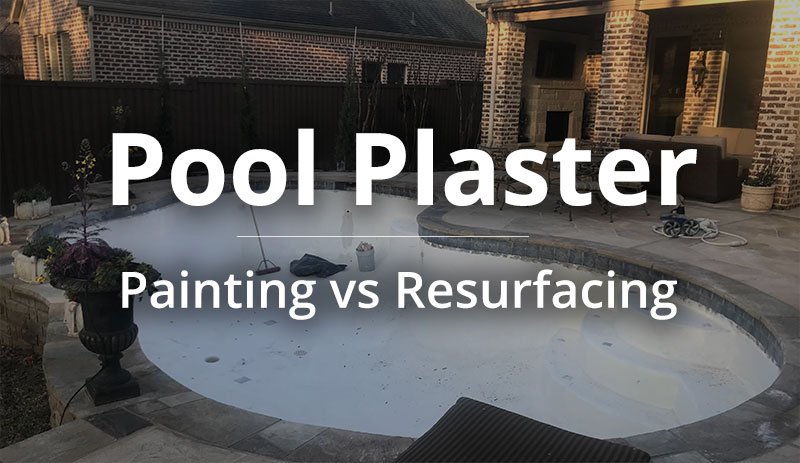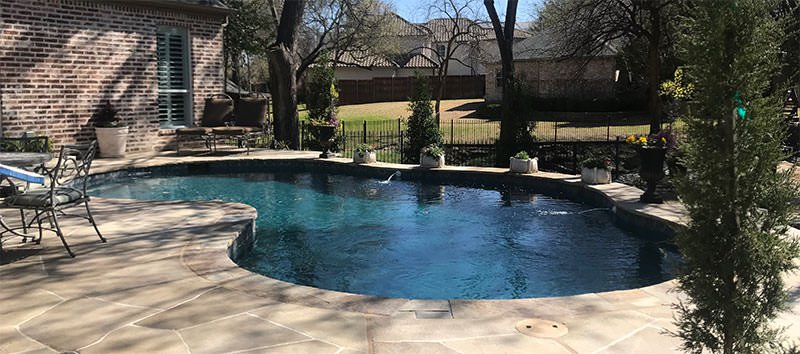The debate between adding a new plaster layer or just applying paint is one that pool owners must deal with at some point. Compared to resurfacing interior plaster, it may appear that painting is the more affordable solution.
However, pool experts seem to all agree that in the long run, resurfacing your plaster is the better alternative.
Below, we will explore why that is.
Painting a Plaster Pool
There are a couple reasons why experts are against painting a plaster pool.
For one, pool resurfacing contractors enjoy their work and want pool owners to have a surface that will last for many years. However, experts agree that the long-term costs of painting a pool are more than resurfacing the plaster.
Due to the array of factors that go into the calculation, it’s hard to directly compare the costs of pool paint vs plaster. While the initial investment for painting plaster is generally half that of resurfacing plaster, the protection is inferior, and you will need a new paint job before long.
Pool Painting Contractors
You can cut costs by painting the pool on your own instead of hiring a pool painting contractor. Most rubber paints and epoxies specifically designed for use in pools come with basic directions that make it somewhat easy for the typical pool owner to get the job done.
If you are confident in your abilities to paint, you will save a lot over hiring a contractor.
The pool industry is quite competitive so if you do contact a pool painting contractor, may of them will be more than happy to paint your pool, regardless of whether it is the best solution for your circumstances.
Instead, your best bet is to consult with a contractor who has experience working on your pool type and finding out which they recommend: pool paint vs. plaster.
Pool Finish Comparisons
There are several factors to consider when doing pool finish comparisons.
We’re going to look at a few of the most important factors and determine whether replastering or painting is the better option.
Prep Work and Application
In addition to draining the pool, you need to degrease the surface using TSP scrub, acid etch the plaster, then wash and scrub with TSP again before you can paint. For epoxy paints, you also need the pool to dry for up to five days. You then apply a coat of paint with long, even strokes, wait six hours, and apply another coat.
Pool plaster is much more involved. You need a crew to remove the old plaster, acid etch the pool, apply a bond coat, and then a crew will come out and shoot the plaster out with a hose.
You will then be given a few upkeep instructions.
Cost
Pool paint is among the most expensive paints available. It goes for around $100 per gallon, and your pool will likely need up to 10 gallons.
You can expect to pay around $4,000 for a plaster job, but this will vary depending on your pool. We will cover this more below, but plaster will last you about four times as long as paint.
Check out our pool resurfacing calculator to get an instant estimate for what it would cost to resurface your pool with plaster.
If the only factor you are considering is cost, painting your pool is the winner.
Appearance
Plaster takes the edge here.
The standard white plaster has a luster that resembles an eggshell. With a Designer Series or a Mini Pebble you can pick from a variety of colors and get exactly what you want.
Paint is more reflective and shiny. Over the long term, plaster will definitely look better as paint starts to wear, peal, and flake after a couple years.
Durability
This brings us to durability.
Sure, paints used in pools are specifically designed to be used underwater and to handle rough treatment, extreme temperatures, and poor water chemistry, but at half an inch thick, plaster can handle much more than a thin layer of paint.
How Long Does Pool Paint Last?
There are many different factors that will play into answering the question: how long does pool paint last?
For instance, the paint comes in at least three different types. Each variety differs in service life expectations, application requirements, and costs.
For the most part, you can expect your pool paint to last anywhere from two to five years.
Epoxy will last you the longest: five to seven years. Rubber based paint has a little bit shorter lifespan. And, you can count on acrylic paint lasting two to four years.
Of course, these numbers can vary drastically depending on whether a professional does the paint job (which will cost more.)
Also, if the new layer of paint is applied to a pool that already has several layers, it will not last as long.
You can extend the life of the paint job by sandblasting the previous paint layers before applying the new layer, but this usually costs a couple thousand dollars.
Can You Paint a Plaster Pool?
So, can you paint a plastered pool?
Yes.
Is it a good idea to paint a plastered pool?
At Willsha Pools, we would say NO.
However, it has become commonplace. Compared to new plaster, paint requires reapplications about four times as often, it doesn’t feel as good, it doesn’t look as good, and painting your pool costs more when you factor in all of the costs in the long term.
Pools that are regularly painted will not age anywhere near as well as pools that receive a new plaster surface every couple decades.
Years of inferior interior surfacing will lead to cracking of the shell, which might include structural cracks. With the increase in water migration through the shells, coping and tile failures are more common in painted pools.
You might also notice the rebar rusting far faster in painted pools than in ones that are replastered.
The bottom line is that the interior surface of painted pools becomes more unstable as water passes through, which can lead to greater problems down the road.
If you are in the Dallas/Fort Worth Metroplex and think your pool needs an update, contact Willsha Pools today, and we will give you an honest assessment of what will work best for your budget and circumstances.


